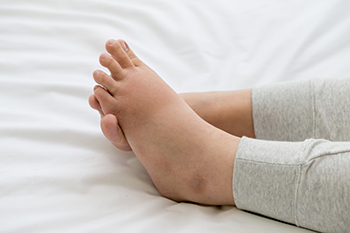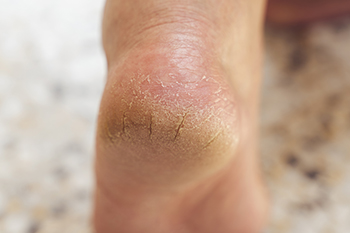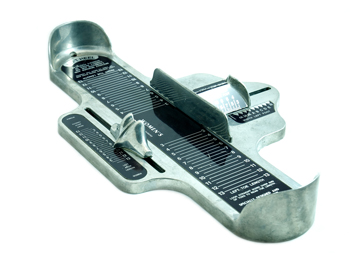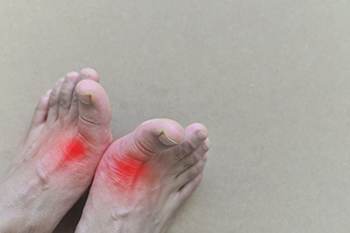Blog
Items filtered by date: October 2023
Various Reasons Feet Can Swell

Swollen feet, also known as edema, is a common condition that can affect individuals of all ages. This ailment presents as an abnormal accumulation of fluid in the feet and ankles, causing them to appear larger than usual and often accompanied by discomfort. There are numerous reasons why feet may become swollen, ranging from minor to more serious causes. Among the most common triggers are prolonged sitting or standing, particularly in hot weather, which can lead to fluid retention. High salt intake, obesity, and certain medications can exacerbate this effect. Injuries and strains, such as a twisted ankle, may also result in localized swelling. Underlying health conditions, such as heart, kidney, or liver disease, can contribute to generalized edema throughout the body, including the feet. Furthermore, issues like deep vein thrombosis and lymphedema can cause foot swelling. Pregnancy, too, often leads to edema due to hormonal changes and increased blood volume. It is important to differentiate the cause of swollen feet, as some instances can indicate underlying health problems. If you have swollen feet, it is suggested that you confer with a podiatrist who can help you determine the cause and offer effective relief options.
Swollen feet can be a sign of an underlying condition. If you have any concerns, contact Dr. Dean D. Hinners of Illinois. Our doctor can provide the care you need to keep you pain-free and on your feet.
Swollen feet are a common ailment among pregnant women and people who stand or sit for extended periods. Aging may increase the possibility of swollen feet and patients who are obese often notice when their feet are swelling too. There may be medical reasons why swollen feet occur:
- Phlebitis - A condition that causes the veins to become inflamed and can also cause leg pain.
- Liver disease - This may lead to low blood levels of albumin which is a protein. This can cause fluid in the blood to pass into the tissues and several areas of the body can become swollen.
- Heart failure - When the heart doesn’t pump properly the blood that is normally pumped back to the heart can pool in the veins of the legs causing swollen feet.
- Kidney disease - One of the main functions of the kidneys is releasing excess fluid in the body. This type of condition can make it difficult for the kidneys to function properly, and as a result the feet may become swollen.
- Deep-vein thrombosis (DVT)- This is a serious condition where blood clots form in the veins of the legs. They can block the return of blood from the legs to the heart which may cause the feet to swell. It is important to be treated by a podiatrist if this condition is present.
Swollen feet can also be caused by bone and tendon conditions, including fractures, arthritis, and tendinitis. Additionally, there may be skin and toenail conditions and an infection may cause the feet to swell. Patients who take medicine to treat high blood pressure may be prone to getting swollen feet.
Many patients elevate their feet to help relieve the swelling and this is generally a temporary remedy. When a podiatrist is consulted the reason behind the swelling can be uncovered and subsequently treated.
If you have any questions please feel free to contact one of our offices located in Metropolis and Eldorado, IL . We offer the newest diagnostic tools and technology to treat your foot and ankle needs.
Causes and Treatment of Heel Fissures

Heel fissures, which are cracks in the skin on your heels, can be more than just a cosmetic concern. Heel fissures often lead to discomfort and may even pose a risk of painful infections and skin damage. Diabetics are particularly susceptible to heel fissures because of the effects of damaged nerves in the feet that hinder natural moisturization. Dry skin is the most common cause associated with heel fissures, but various factors may contribute to their formation. Among them are eczema, athlete's foot, and environmental conditions. Additionally, medical conditions such as hypothyroidism, psoriasis, and rheumatoid arthritis can be factors. Any condition that results in the thickening of tissue or affects sweat production can heighten the risk. To tackle heel fissures, consider applying thick moisturizers twice a day. For more stubborn cases, a podiatrist may prescribe the use of products containing alpha hydroxy acids, salicylic acids, or urea to help shed dead skin cells. Anyone with heel fissures is wise to take this condition seriously. For help, it is suggested that you make an appointment with a podiatrist for an exam and appropriate treatment options.
If the skin on your feet starts to crack, you may want to see a podiatrist to find treatment. If you have any concerns, contact Dr. Dean D. Hinners from Illinois. Our doctor can provide the care you need to keep you pain-free and on your feet.
Cracked Heels
It is important to moisturize your cracked heels in order to prevent pain, bleeding, and infection. The reason cracked heels form is because the skin on the foot is too dry to support the immense pressure placed on them. When the foot expands, the dry skin on the foot begins to split.
Ways to Help Heal Them
- Invest in a good foot cream
- Try Using Petroleum Jelly
- Ease up on Soaps
- Drink Plenty of Water
Ways to Prevent Cracked Heels
- Moisturize After Showering
- Skip a Shower
- Keep Shower Water Lukewarm
- Don’t Scrub Your Feet
If you are unsure how to proceed in treating cracked heels, seek guidance from a podiatrist. Your doctor will help you with any questions or information you may need.
If you have any questions, please feel free to contact one of our offices located in Metropolis and Eldorado, IL . We offer the newest diagnostic and treatment technologies for all your foot care needs.
Exploring Methods to Measure Foot Size

Ensuring your shoes fit comfortably is essential for overall foot health and mobility. Various methods can help you accurately measure your foot size to find the perfect size of shoes. The simplest approach is to use a ruler or a Brannock device, a common tool available in shoe stores. Be sure you measure both feet, as they may differ slightly in size. Alternatively, the sock test involves tracing your foot on a piece of paper while wearing socks, and then measuring their length and width. There are also smartphone apps designed to measure foot size using the device's camera. Remember to measure your feet later in the day when they may be slightly swollen, and consider the type of socks you plan to wear with your shoes. Accurate measurements ensure comfortable and well-fitting shoes, possibly reducing the risk of foot-related discomfort and problems. If you would like more specific instructions on how to measure your feet to obtain their proper size, it is suggested that you speak to a podiatrist who can provide you with useful information.
It is important to find shoes that fit you properly in order to avoid a variety of different foot problems. For more information about treatment, contact Dr. Dean D. Hinners from Illinois. Our doctor will treat your foot and ankle needs.
Proper Shoe Fitting
Shoes have many different functions. They cushion our body weight, protect our feet, and allow us to safely play sports. You should always make sure that the shoes you wear fit you properly in order to avoid injuries and deformities such as: bunions, corns, calluses, hammertoes, plantar fasciitis, stress fractures, and more. It is important to note that although a certain pair of shoes might be a great fit for someone else, that doesn’t mean they will be a great fit for you. This is why you should always try on shoes before buying them to make sure they are worth the investment. Typically, shoes need to be replaced ever six months to one year of regular use.
Tips for Proper Shoe Fitting
- Select a shoe that is shaped like your foot
- Don’t buy shoes that fit too tight, expecting them to stretch to fit
- Make sure there is enough space (3/8” to ½”) for your longest toe at the end of each shoe when you are standing up
- Walk in the shoes to make sure they fit and feel right
- Don’t select shoes by the size marked inside the shoe, but by how the shoe fits your foot
The shoes you buy should always feel as good as they look. Shoes that fit properly will last longer, feel better, and improve your way of life each day.
If you have any questions, please feel free to contact one of our offices located in Metropolis and Eldorado, IL . We offer the newest diagnostic and treatment technologies for all your foot care needs.
Arthritis Can Cause Pain in the Feet and Ankles
Features of Running Shoes for Marathoners

When it comes to marathon running, a grueling 26.2-mile journey, selecting the ideal pair of running shoes can significantly affect your performance and overall foot health, as well as prevent injury. Here are some essential features to consider when choosing your marathon running shoes. Cushioning plays a vital role in marathon shoes. Select shoes with adequate midsole cushioning to absorb the shock generated by each stride. Arch support for proper foot alignment is essential to prevent overpronation or supination, either of which can lead to discomfort and potential injuries. Breathability is important, as running for extended periods can result in sweaty feet, which may lead to discomfort, infection, and even blisters. The weight of marathon shoes cannot be ignored. The lighter the shoe, the less fatigue your legs will experience over the long distance. Lastly, durability should not be underestimated. Marathon training and racing can put your shoes through significant wear and tear. To ensure your shoes last the distance, select pairs constructed from high-quality materials designed to withstand the rigors of marathon running. For additional help with selecting the right running shoes, it is suggested that you consult a podiatrist.
If you are a runner, wearing the right running shoe is essential. For more information, contact Dr. Dean D. Hinners from Illinois. Our doctor can provide the care you need to keep you pain-free and on your feet.
Choosing the Right Running Shoe for Your Foot Type
To increase performance and avoid the risk of injury, it is important to choose the right running shoe based on your foot type. The general design of running shoes revolves around pronation, which is how the ankle rolls from outside to inside when the foot strikes the ground.
- Neutral runners are able to choose from a wide variety of shoes, including minimalist shoes or even going barefoot.
- Runners who overpronate, or experience an over-abundance of ankle rolling, should choose shoes that provide extra motion control and stability.
- Runners who underpronate, or supinate, have feet that have high arches and lack flexibility, preventing shock absorption. They require shoes with more flexibility and cushion.
If you have any questions please feel free to contact one of our offices located in Metropolis and Eldorado, IL . We offer the newest diagnostic and treatment technologies for all your foot and ankle needs.
Causes and Symptoms of Gout

Gout is a type of arthritis characterized by sudden, severe joint pain and inflammation, typically affecting the big toe, although it can occur in other joints as well. Understanding the causes and symptoms of gout is essential for early diagnosis and effective management. Gout is primarily caused by high levels of uric acid in the blood, a condition known as hyperuricemia. Uric acid crystals can accumulate in the joints, leading to painful gout attacks. Several factors can contribute to elevated uric acid levels, including genetics, and a diet rich in purines which are found in red meat, seafood, and alcohol. Additionally, taking certain medications and obesity may lead to developing gout. The symptoms of gout often appear suddenly and include intense joint pain, swelling, redness, and warmth surrounding the affected joint. Gout attacks can be excruciating, and the pain may persist for days or weeks if left untreated. Managing gout involves lifestyle modifications, dietary changes, and medications to lower uric acid levels. Prompt medical attention and understanding the causes and symptoms are crucial for preventing and mitigating the effects of gout. If you are afflicted with gout, it is strongly suggested that you are under the care of a podiatrist who can help you to manage this condition.
Gout is a foot condition that requires certain treatment and care. If you are seeking treatment, contact Dr. Dean D. Hinners from Illinois. Our doctor will treat your foot and ankle needs.
What Is Gout?
Gout is a type of arthritis caused by a buildup of uric acid in the bloodstream. It often develops in the foot, especially the big toe area, although it can manifest in other parts of the body as well. Gout can make walking and standing very painful and is especially common in diabetics and the obese.
People typically get gout because of a poor diet. Genetic predisposition is also a factor. The children of parents who have had gout frequently have a chance of developing it themselves.
Gout can easily be identified by redness and inflammation of the big toe and the surrounding areas of the foot. Other symptoms include extreme fatigue, joint pain, and running high fevers. Sometimes corticosteroid drugs can be prescribed to treat gout, but the best way to combat this disease is to get more exercise and eat a better diet.
If you have any questions please feel free to contact one of our offices located in Metropolis and Eldorado, IL . We offer the newest diagnostic and treatment technologies for all your foot and ankle needs.

